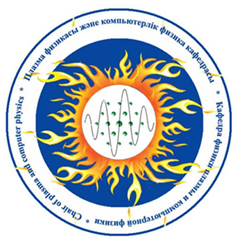Plasma physics, nanotechnology and computer physics department
Department address: Al-Farabi, 71, Faculty of Physics and Technology.
Location: 3d floor, 310 room
Department telephone: 8 (727) 221-15-53
We are on the social networks
 |
 |
1. https://www.facebook.com/PlasmaPhysicsKazNU/
2. https://www.instagram.com/plasma_phys_computer_phys/
|
Head of Department of Telephone: +7(727) 221-15-53 |
|
 |
Deputy Head of Department on educational activities Nurusheva M.M.Телефон: +7(727) 221-15-53
|
|
Areas of training
|
Deputy Head of Departmentfor scientific and innovative activities and international relations Tazhen A.B. Phone: +7(727) 221-15-53 E-mail: Aigerim.Tazhen@kaznu.edu.kz |
|
Area with code |
direction with code |
Groups of educational programs |
Name of the educational program (EP) |
|
Level: bachelor's degree |
|||
|
6B05 Natural Sciences, mathematics and statistics |
6B053 Physical and chemical Sciences |
В54 Physics |
6B05302 – Cyberphysics |
|
6B05305 – Physics and nanotechnology |
|||
|
6B05309 – Computer physics |
|||
|
6B07 Engineering, manufacturing and construction industries |
6B071 Engineering |
В63 Electrical engineering and power engineering |
6B07107 – Electroenergetics |
|
Level: master's degree |
|||
|
7М01 Pedagogical science |
7М015 Training of teachers in natural science subjects |
М10 Training of physics teachers |
7M01501 – Physics |
|
7М07 Engineering, manufacturing and construction industries |
7М071 Engineering |
М63 Electrical engineering and power engineering |
7M07112 – Electroenergetics |
|
7М07111 – Management in the electroenergetics |
|||
|
7М07088 Interdisciplinary programs related to engineering, manufacturing and construction industries |
|
7M07120 - Nanomaterials and nanotechnologies |
|
|
7М05 Natural sciences, mathematics and statistics |
7М053 Physical and chemical Sciences |
М54 Physics |
7М03315 – Plasma physics (MEPhI) |
|
Level:doctoral study (PhD) |
|||
|
8D01 Pedagogical science |
8D015 Training of teachers in natural science subjects |
D10 Training of physics teachers |
8D01501 - Physics |
|
8D07 Engineering, manufacturing and construction industries |
8D071 Engineering |
D63 Electrical engineering and power engineering |
8D07108 – Electroenergetics |
|
8D07088 Interdisciplinary programs related to engineering, manufacturing and construction industries |
|
8D07112 - Nanomaterials and nanotechnologies |
|
The main subjects taught by teachers of the Department of plasma physics, nanotechnology and computer physics
1. Electricity and magnetism;
2. Atomic physics;
3. Atomic and nuclear physics;
4. Physics 1, 2;
5. Computer modeling of technological processes;
6. The concept of modern science;
7. Introduction to plasma physics;
8. Fundamentals of plasma physics;
9. Gas discharge physics;
10. Fundamentals of vacuum engineering and technology;
11. Fundamentals of plasma electrodynamics;
12. Ionosphere and cosmic plasma;
13. Numerical methods in plasma physics;
14. Physics of dusty plasma;
15. Physics of elementary plasma processes;
16. Theoretical foundations of electrical engineering 1, 2;
17. Industrial electronics;
18. Electric machines;
19. Equipment high voltage;
20. Relay protection;
21. Electrical networks and systems;
22. Electrical part of the station and substation;
23. Electrical appliances and equipment;
24. Engineering and computer graphics;
25. Automation of technological processes;
26. Alternative and renewable energy;
27. 27. Information and measurement technology;
28. Information systems in science and education;
29. Technique of school experiment;
30. Computer modeling of physical processes;
31. New standards and curricula in secondary schools;
32. Information technologies in the work of a physics teacher;
33. Solving physical problems using programming systems;
34. Applied mathematics in physics and engineering;
35. Kinetic theory of open systems;
36. 3D modeling and computer graphics;
37. Modern methods of teaching physics in HIGHER education institutions;
38. Scientific pedagogical bases of the "University 4.0" model;
39. Management of scientific and pedagogical research;
40. Methods for assessing knowledge and skills of physics training control;
41. Business activity in the electroenergetics;
42. Managing power quality;
43. Design of Autonomous energy systems;
44. Automated electric drive;
45. Introduction to nanotechnology;
46. Nanotechnology in medicine;
47. Nanostructured materials in construction;
48. Synthesis of carbon composite nanomaterials in a plasma medium;
49. Manufacturing of nanostructures and composite nanomaterials;
50. Project management in the electroenergetics;
51. Marketing activities in the electroenergetics;
52. Reliability of electric electroenergetics;
53. Electrical safety and labour protection.









